Iraqis Refuse To Sell USD To Travelers Due To US Sanctions: Ex-Official

The former secretary general of the Iran-Iraq chamber of commerce has confirmed that it is difficult to buy US dollars for travelers in Iraq due to US restrictions.

The former secretary general of the Iran-Iraq chamber of commerce has confirmed that it is difficult to buy US dollars for travelers in Iraq due to US restrictions.
Mehdi Karami Pour told Shargh daily that he has been in Iraq last week and even had trouble getting a taxi.
A Shargh reporter also wrote on twitter that a number of Iranian travelers in Iraq said that due to the imposition of US restrictions on dollar transactions by Iraqi banks, exchange offices do not sell foreign currency to travelers.
Ali Shariati, a member of the Chamber of Commerce and a businessman, has also confirmed the news, saying that in Iraqi media Iran has been introduced as the main cause of inflation in the country and its dollar crisis.
According to reports many Iranian companies in Iraq do not have a clear identity and after Iraq joins the Financial Action Task Force (FATF) the activity of these firms would become even more difficult.
Washington has imposed new restrictions on dollar transfers to Iraq as the Arab country’s banking officials believe there is widespread money laundering for the purpose of sending funds to Iran and Syria, both under US banking sanctions.
Iraq is now feeling the result, with an unprecedented drop in the value of its currency.
Hundreds of people demonstrated near the central bank headquarters in Baghdad to protest the devaluation of the Iraqi dinar against the dollar, which has triggered a rise in prices of imported consumer goods.
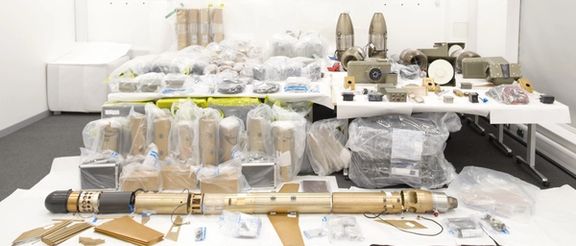
The United Kingdom has submitted evidence to the UN showing that the Iran’s Revolutionary Guard (IRGC) is violating Security Council resolutions.
According to a statement by the UK Ministry of Defense on Monday, weapons seized by Royal Navy ship HMS Montrose, which have been presented to the UN as evidence, proved the IRGC is smuggling weapons in violation of a UN Security Council resolution, indicating that the UK is turning the screws on the Islamic Republic.
“On two occasions in early 2022, HMS Montrose seized Iranian weapons from speedboats operated by smugglers in international waters south of Iran,” the statement said, adding that “the items included surface-to-air-missiles and engines for land attack cruise missiles, in contravention of UN Security Council Resolutions 2231 and 2140,” approved in 2015.
The defense ministry also said that “The weapons were presented to representatives of the United Nations who provide an assessment of the conflict in Yemen and Iranian nuclear activity.” “The interdictions were referred to in the Secretary General’s UNSCR 2231 report published in December 2022 and are expected to feature in the UNSCR 2140 annual report that will shortly be released.”
In reference to the evidence, Defense Secretary Ben Wallace said that London is committed to upholding international law and will continue to counter Iranian activity that contravenes UNSC resolutions and “threatens peace across the world.” That is why the UK has a permanent Royal Navy deployment in the Persian Gulf region, conducting vital maritime security operations and working in support of peace in Yemen, he added. The Royal Navy has a permanent deployment of a Type 23 Frigate, equipped with a Royal Marine boarding party and a Wildcat helicopter to support maritime security operations in the Gulf of Oman.

A key piece of evidence presented by the UK was a commercial quadcopter drone designed for reconnaissance activities. According to the statement, “By decrypting the internal memory of the uncrewed aerial vehicle (UAV) controllers, the UK Ministry of Defense discovered the records of 22 test flights conducted at the IRGC Aerospace Force Headquarters and test facility in western Tehran." The Islamic Republic failed to delete flight logs from a drone on its way to Yemen.
Minister of State for the Middle East, Lord (Tariq) Ahmad of Wimbledon said, “Once again, the Iranian regime has been exposed for its reckless proliferation of weapons and destabilizing activity in the region.”
Iran’s sustained military support to the Houthis and continued violation of the arms embargo has stoked further conflict and undermined UN-led peace efforts, the official added, noting that “The UK will continue to act to protect the security of our partners and hold Iran to account.”
“The UAV was in the same shipment as a number of Surface to Air Missiles and components for the Iranian Project 351 land attack cruise missile. This evidence indicated a direct link between the Iranian state and the smuggling of missile systems being used by the Houthis to attack the Kingdom of Saudi Arabia and the United Arab Emirates,” read the statement.
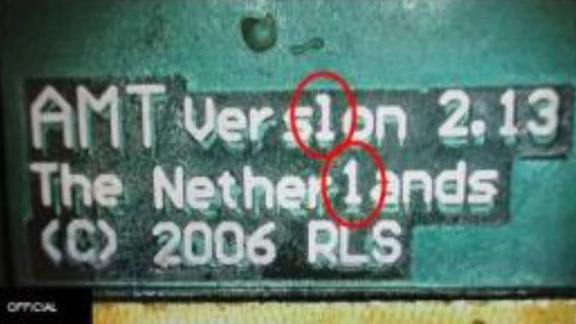
The Iranian regime has been arming, training and supporting Houthi forces since at least 2015. Previous weapons and missiles used by the Yemeni rebel force were examined by UN experts before and found to have Iranian origin.
The UK defense ministry added that “The threat posed by long range weapons made in Iran is not limited to the Middle East. Since the invasion of Ukraine, Iran has supplied hundreds of Shahed one way attack drones to Russia; these transfers violate UNSCR 2231. These attacks have killed civilians and damaged critical national infrastructure (such as power substations) far from the front lines of the conflict.
The British government also revealed that a typo in the word "Netherlands" helped expose illegal Iranian weapons shipments to Yemen. The word was spelt "Nether1ands" on part of a missile engine, in what defense officials believe was a clumsy attempt by Iran to pretend the component was Dutch. The word "version" was also misspelt as "verslon" in one of the missile parts seized by Britain's Royal Navy last year.
Such evidence can be used in case of snapback at the UN Security Council. In December, the United States, France, and the United Kingdom met to argue that Russia and Iran are violating UN Security Council Resolution 2231 by Tehran sending military drones to Moscow

Saudi Arabia says its foreign minister has held talks with the EU foreign policy chief Josep Borrell about the Iranian nuclear program and talks for a new deal with Iran.
In a statement released Monday, Saudi Foreign Ministry said the Arab Kingdom’s Foreign Minister Faisal bin Farhan and Borrell exchanged views regarding Iran’s nuclear program and reviewed relations between Riyadh and the European Union.
“The two sides also discussed the latest regional and international developments and the efforts made to strengthen international peace and security,” added the statement.
However, the European Union in its statement did not mention the discussion of Iran’s issue during the talks between the two sides.
“Mr. Borrell, convened a meeting in Brussels with His Highness Prince Faisal bin Farhan, Foreign Minister of the Kingdom of Saudi Arabia, and Secretary-General of the League of Arab States, Mr. Aboul Gheit. They discussed the Middle East Peace Process, the increasing number of victims of violence, conflict and occupation, and the absence of a political perspective for a peaceful solution,” said the EU statement.
Earlier, the US Department of State announced a senior government delegation will travel to Saudi Arabia “to attend meetings which will focus on three priority sets: Integrated Air and Missile Defense and Maritime Security, Iran, and Counterterrorism.”
The US delegation will be led by Special Envoy for Iran Rob Malley, added the State Department.

Iran claims its exports to Iraq are on the rise approaching $10 billion despite pressure by the United States on Baghdad to stop the IRGC’s money smuggling from the Arab country to Iran.
Abdol-Amir Rabihavi, the business adviser of the Islamic Republic in Iraq, told IRNA that Iran's exports to Iraq have been growing, and by the end of the current Iranian year in March, this figure will reach 10 billion dollars.
He said the US has decreased the supply of dollars to the Iraqi market which previously was at least $250 million per day. “The average supply of dollars, which is completely controlled by Washington, is now between 79 million and 84 million dollars per day, and in fact, the United States is responsible for the sharp decrease in the supply of dollars in Iraq,” he said.
In early February, Iran International obtained information that revealed some details about the inner workings of a Revolutionary Guard’s Quds force unit tasked with smuggling money from Iraq to Iran.
Iran is apparently facing a serious shortage of foreign currencies. Its currency, the rial, has fallen by 50 percent in the past years and now stands at a historic low of 460,000 rials to one US dollar.
In January, Iraq’s currency also fell substantially against the US dollar leading to reports that US banks had instituted tougher review of transactions originating from Iraqi banks, leading to a shortage of dollars in Iraq.
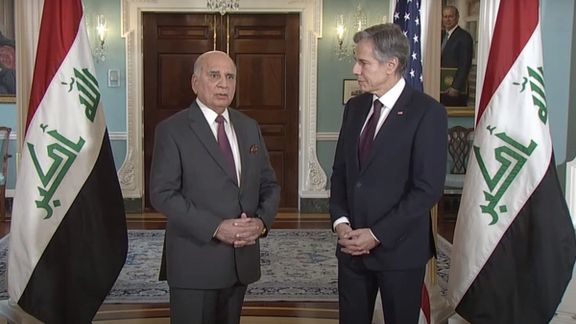
US officials have discussed banking and money laundering issues related to Iran with a high-ranking Iraqi delegation that visited Washington this week.
Deputy Prime Minister and Foreign Minister of Iraq, Fuad Hussein accompanied by Central Bank Of Iraq Governor Ali al-Allaq met with both the State Department and with Treasury to discuss a host of economic issues. But an urgent issue was how to prevent Iran from using Iraq’s banking ties with the United States to launder US dollars and circumvent Washington’s sanctions.
The outcome of the talks on this specific issue are not clear yet, but a statement from the US Department of the Treasury made it clear that the problem was among the main topics discussed.
The Treasury said that the two sides discussed the Iraqi “government’s plans for economic and financial sector reforms and a mutual commitment to anti-money laundering and countering the financing of terrorism (AML/CFT) measures.”
In January, Iraq’s currency fell substantially against the US dollar leading to reports that US banks had instituted tougher review of transactions originating from Iraqi banks, leading to a shortage of dollars in Iraq.
The Associated Press reported that the move was triggered a couple of months before to stamp out what Iraqi officials describe as rampant money laundering that benefits Tehran and Damascus which are under US sanctions.
According to information received by Iran International in early February, Iran’s Revolutionary Guard and the Islamic Republic’s embassy in Iraq are involved in the money laundering operations that aim to funnel the regime’s revenues from oil and gas exports back to Iran. As per a repeatedly extended sanctions’ waiver by Washington, Tehran is only allowed to import medicine and some essential goods in exchange for its exports of gas and electricity to its neighboring country.
According to a report by London-based newspaper Asharq Al-Awsat, the decline in the value of Iraq’s dinar and the accompanying price increases for foodstuffs and imported goods can be traced back to a remarkable change in the policy adopted by the US Treasury and the Federal Reserve Bank of New York.
To what extent these issue were resolved during the Iraqi delegation’s visit to Washington is not clear, but banking reforms were mentioned in statements and that shows this was a key topic in the discussions.
Iran is apparently facing a serious shortage of foreign currencies. Its currency, the rial, has fallen by 50 percent in the past years and now stands at a historic low of 500,000 rials to one US dollar.
Despite tougher implementation of US banking regulations by the Treasury, the tone of US officials was extremely deferential and respectful of the Iraqi government. State Department Spokesperson Ned Price during his briefing on February 9 described bilateral relations as one of close partners.
“Our relationship with the Government of Iraq is one based on partnership. It is one based on mutual respect. It is based on our mutual interests and what works to the benefit of both of our countries. It is not our approach…to issue demands, to issue decrees. When we engage with our Iraqi partners, we do often talk about the challenges that we confront in the region and well beyond. Many of those challenges are challenges to both of our interests. Iranian-backed forces in some cases pose a challenge to both of our interests,” Price told reporters.
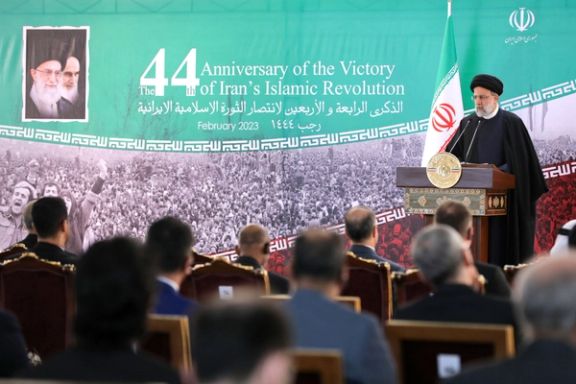
As the Islamic Republic is set for state-sponsored events for the 44th anniversary of its establishment on Saturday, European countries are calling for the boycott of the events.
In a statement on Thursday, members of several groups in the European Parliament and national parliaments called on European countries to boycott the ceremonies, and stand in solidarity with “the Iranian people who are fighting for their rights.”
Weeks before the anniversary of Islamic Republic’s establishment, a campaign was launched to boycott the regime’s ceremonies over the violent crackdown on nationwide protests sparked by the death in custody of Iranian Kurdish 22-year-old woman Mahsa Amini.
“We, cross-party Members of the European Parliament and Members of national parliaments, are urging the governments of the EU member states and the European External Action Service to boycott tomorrow's ceremony in Tehran for the anniversary of the Islamic revolution that brought this brutal regime to power. Likewise, EU officials ought to stay away from any such regime celebrations in Iranian embassies abroad,” read the statement.
The Islamic Republic government organizes 10 days of celebrations known as Fajr – literally meaning dawn – but the final day, February 11, is the most important one, in which the regime heavily invests. It already held an event on Thursday with a group of foreign ambassadors to the Islamic Republic with President Ebrahim Raisi in attendance. The government did not release the list of the participants but according to some reports envoys from European countries did not participate in the event – except for Hungary and Poland.
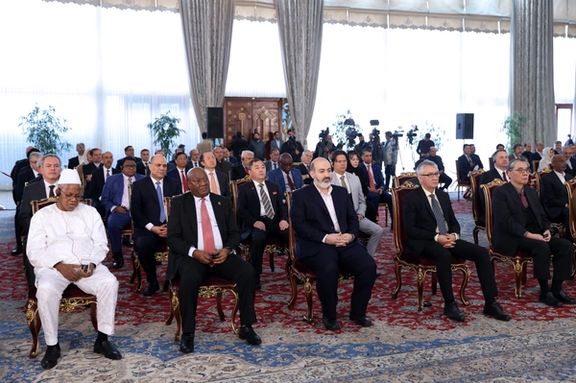
Dismayed by a lack of participation of Western envoys, Raisi said during the event that “The US and the three European countries [that are signatories to the 2015 nuclear deal] were caught up in a state of delusion and made miscalculations” by “meddling in Iran’s domestic affairs,” referring to the ongoing uprising.
Hailing the unanimity of European countries, US Senator Bob Menendez, Chairman of the Senate Foreign Relations Committee, tweeted, “Glad to see broad EU consensus against Islamic Revolution Day in Tehran, except from Orban’s Hungary, which all too regularly embraces autocrats, and Poland, whose silence is disappointing.”
“Nobody should be celebrating a regime with this much blood on its hands,” he added.
The statement by the MEPs added that “Over the past 44 years, the Islamic Republic has murdered tens of thousands of Iranians and has spread terror, misery and war throughout the region and beyond. Together with the Assad regime and Russia, the regime in Iran has carried out horrific war crimes in a conflict that has killed over 500,000 Syrians.”
The statement drew attention to the fact that hundreds of protesters have been killed, “for the 'crime' of demanding freedom, democracy and dignity and above all equal rights for women. Women and even young girls are being harassed, arrested, tortured, raped and murdered for simply refusing to wear the hijab or just for not fully covering their hair. At least 100 Iranians are facing the death penalty over their participation in protests following sham trials where the accused had just 15 minutes to defend themselves.”
Touching upon the growing military ties between Iran and Russia, the statement warned that “Tehran is now intensifying its growing alliance with Russia by supplying Moscow with Kamikaze drones designed to terrorize the Ukrainian people and to destroy their critical infrastructure.”
The MEPs said that celebrating “the rise to power of this odious regime” by European politicians and ambassadors -- even low-ranking diplomats -- would be “an inexcusable violation of our own values and a betrayal of the Iranian people as well as the regime's countless victims in the region and in Ukraine.
“Any official European participation in these celebrations would play into the hands of the Islamic Republic,” they said, adding that the mullahs would like nothing more than to demonstrate that despite their repression of the protests, it is "back to business as usual" with the EU.